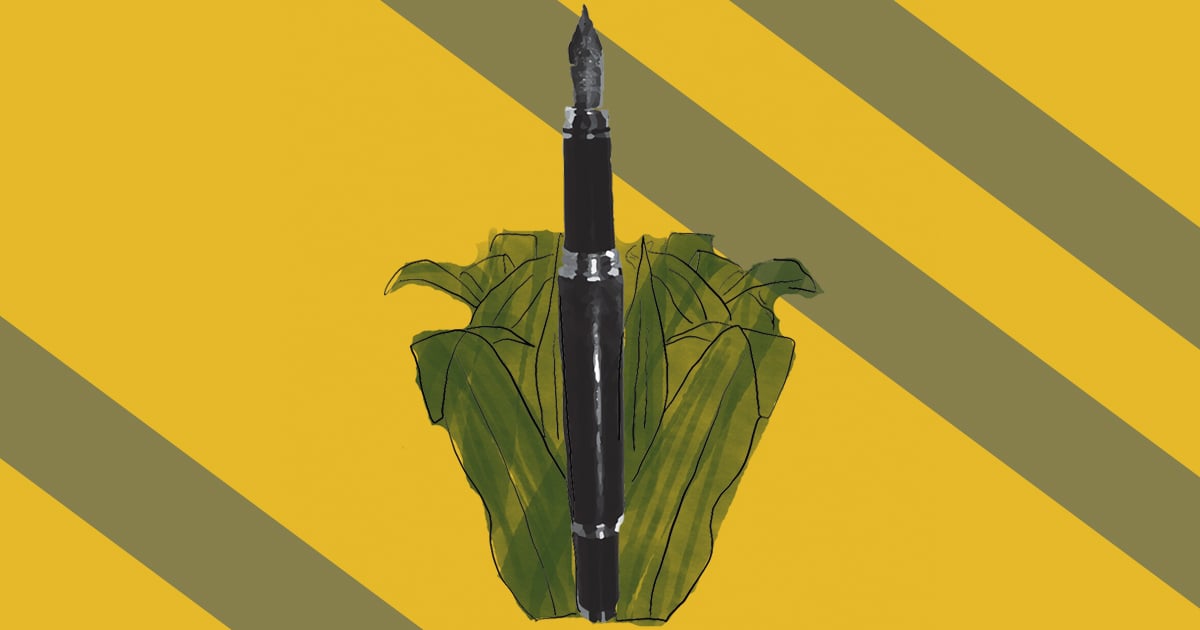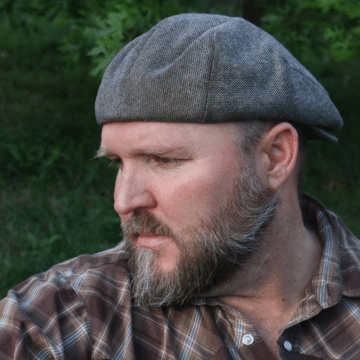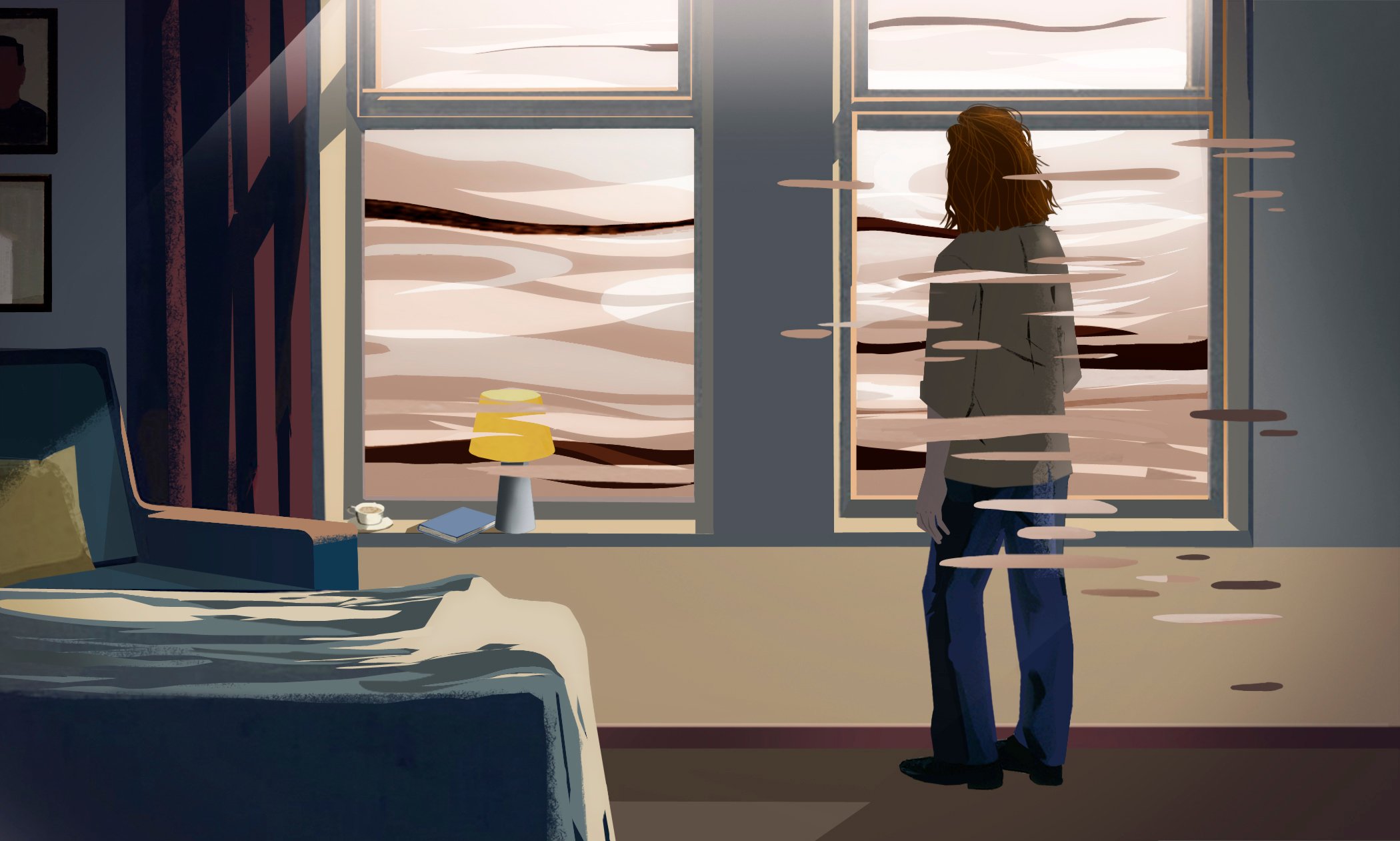
Ink Upon the Furrows
In this year's Texas Observer Short Story Contest winner, Daniel Zima, publisher/editor of a Czech-language newspaper, delivers papers to his elderly neighbors in a nursing home while awaiting a buyer he suspects will never appear.

A version of this story ran in the October 2018 issue.
If you’re considering entering the 2019 Observer story contest, you could do worse than to write a story about a small Texas publication fighting an uphill battle. It’s no surprise we’re suckers for that kind of thing.
With “Ink Upon the Furrows,” Heath Dollar captures, in fewer than 2,500 words, the death of a newspaper, a language and an entire culture smack dab in the middle of the Lone Star State. Facing the end of his life, Daniel Zima, publisher/editor of Texaský rolník, the Texas Farmer, a Czech-language newspaper, delivers papers to his elderly neighbors in a nursing home while awaiting a buyer he suspects will never appear.
“I was taken by this story and its palpable sense of nostalgia,” writes guest judge Natalia Sylvester, “how it so quickly yet deeply expresses what it’s like to feel caught between two languages and cultures when one begins to fade along with the lives of those who lived it.”
Congratulations are also in order for our two finalists and 25 honorable mention recipients, whose names are listed at the bottom of this page. —David Duhr
Daniel Zima pushed his walker across the linoleum toward the converted janitor’s closet that served as his office. Daniel had been the publisher of the Texaský rolník, the Texas Farmer, for the last four decades and had written for the paper since he was twenty-four, back when his father’s name appeared at the top of the masthead. His father, Dalibor Zima, died of a heart attack when Daniel was forty-five, and though his father had bequeathed the paper to him, Daniel didn’t want it. He didn’t want to run a newspaper. He even tried to sell the Farmer but had no takers. But then, who would want to buy a Czech-language newspaper in the middle of Texas? That was forty years ago, and somehow Daniel had managed to keep the weekly paper alive.
Now he did not know how much longer he or the newspaper would survive. He was down to thirty-seven subscribers, and of those, seven resided in the same nursing facility as he did. If he could somehow outlive his old-timer readers, they would never have to know life without the Texaský rolník; and then, when Daniel’s time arrived, he would have the final issue, which would lack only the closing details of his obituary, waiting on his desktop ready to print. That issue would also include his farewell, which he imagined would be read only by a handful of Slavic studies professors from universities large enough to have such a major and maybe a couple of graduate students whose master’s theses would be disrupted by his ascent into heaven.
Daniel found it all rather amusing, for these folks treated him like some kind of oracle despite the fact that he tended to spell Czech words phonetically and wrote like a Bohemian Will Rogers, though not for comedic effect but because he didn’t know how to write any other way. Still, considering that neither he nor most of his readership had received much formal schooling in the mateřský jazyk, the mother tongue, he never got too worried about spelling and such. Truth be told, the closest he himself had ever come to instruction in his native tongue was while attending Saints Cyril and Methodius Catholic Church in the little Waylon County town of Krasna Lipa, which continued to conduct mass in Czech, though many parishioners found it no more decipherable than Church Latin.
Since he was already saving on postage, Daniel thought it proper to hand-deliver the paper to the readers in his nursing home. All of these readers were women, and he imagined that he was one of the last male speakers of Texas-Czech alive. Bez práce nejsou koláče: Without work, there are no kolaches, and the men had worked hard in the fields and worn themselves down, though he himself was not in much better shape. He had broken his hip about a year ago while trick-riding on his walker, which he called the Silver Stallion, and he had never truly recovered, but at least he hadn’t died of a blood clot or pneumonia in the weeks after surgery.
He and the newspaper were both lucky to still be here. He attributed his own longevity to hard liquor for the parasites and the strong pioneer heart inside his chest. However, he attributed the newspaper’s century of success to a formula. The front page always included a lectionary from the Catholic Church and a news story, which, over the last few years, had more often than not been the obituary of one of the last members of the Czech-speaking community. The inside pages featured a calendar of events that included polkas, chicken dinners, and church picnics, which had driven circulation for decades. He sold advertising space to Novacek Nursing Home, where he lived, to Milosh’s Czech-Tex Restaurant, and a variety of small businesses including a roto-rooter man and a funeral home. Daniel, of course, translated the ads into Czech at no additional charge.
The language had lasted more than a century and a half in Texas, but now was dying out. Even the companies that advertised in it rarely had an employee who could exchange more than civilities in the language of their progenitors. It made Daniel sad, but there was little he could do at this point. He was among the last of the old-timers.
Daniel took the photocopied newspapers from the copy machine. Before moving to the nursing home, the newspaper had always been sent to a printer, but now it was too difficult for him to get back and forth. And since circulation was so low, it was just as easy to photocopy the newspaper and mail it to his subscribers, the majority of whom lived in little towns like Schulenburg, Shiner, and West. The only place that sold the paper on the stand was the cultural center in La Grange.
Daniel, like most of his subscribers, had been officially retired for years. And knowing what it was like to live on a fixed income, he had not raised the annual subscription rate in twenty-five years. These days, the revenue from the newspaper did little more than cover his toiletries and other sundries, which was fine with him, for he wanted no truck with the taxman. The true profit of the newspaper, he had found, was that it provided him a reason to keep living.
His wife, who was bright, vibrant, and energetic, had died unexpectedly eight years ago. He himself had been experiencing health problems for years, and he would have never dreamed that he would outlive his wife, until he did. Life had changed in a split second, and it had left him reeling, though this was certainly not the first hardship he had faced. They lost their son in Indochina, in a war he thought unnecessary, though he would never say that aloud. And, of course, his parents were long gone.
But still, his daughter, Liliana, was close by. She worked the night shift as a nurse at Waylon County Hospital, and though she visited once or twice a week, Daniel still felt empty sometimes. His old friends and his other relatives were gone. He knew many people in the nursing home, but it wasn’t the same. The people he had known from childhood until the sad day of ashes and dust populated his mind. No phone call could reach them. Letters would return to sender. He wrote their obituaries and mourned. He considered the obituary in the Texaský rolník the final rite.

Daniel spent much of his time in reflection. He loved thinking about the old days, especially days he spent with ink on his hands. He remembered the ink between the furrows of his fingerprints. He remembered the old hardscrabble farmers joking about him not being a farmer though he published the Texas Farmer, and he would show them his hands, show them the ink on his fingers. He told them he planted ink and grew a sense of community. That was his pat response, and the old farmers would laugh and ask him to join them for par piv. This was a joke that could not be told in English because it was a language trick. In Czech, the word pivo means beer. When counting, pivo is used for one beer. Piva is used for two to four beers, and piv is used for five or more. With par meaning two, par piv could loosely be translated as “a couple of five beers.” It was a good joke, and one that was used regularly in the town of Krasna Lipa in the old days.
With a stack of newspapers in the canvas sack upon his shoulder, Daniel started down the hall. The first place he stopped was Mrs. Kohout’s room. He and Mrs. Kohout, who was thin, small, and shrunken, had both attended Saints Cyril and Methodius. They had been to the same beer bash weddings and attended the same Fifth of July picnics with their families to celebrate Cyril and Methodius’ feast day on the liturgical calendar.
“Dobrý den,” Daniel said.
“Dobrý den,” she replied. “What’s in the paper this week?”
“You’ll have to read it. If I tell you, then there’s no use in you subscribing.”
“I like the way you read.”
“You like not having to put on your bifocals.”
“I’m self-conscious about them.”
Daniel wanted to tell her she was pretty either way, but he did not want to seem improper. He had been friends with Mrs. Kohout’s husband, Stan, and he didn’t want his meaning to be misunderstood. He only wanted to make her feel good. He did not want her or any other resident of the nursing home to think him a cad. To remain above reproach, he read her the lectionary, which came from the book of First Maccabees. He read the story of a king who made an alliance with the Gentiles at the cost of his people’s customs.
Mrs. Kohout smiled a gentle smile. “Děkuju,” she said.
“Není za co,” Daniel replied. “You are perfectly welcome.”
Daniel gripped the handles of his walker and moved forward. A couple of doors down, he stopped at Mrs. Kovar’s room. “The Pony Express is here,” he called.
“Daneček,” Mrs. Kovar said. She always called him Daneček, even though he didn’t like the nickname. “Daneček, what is in the paper?”
“You’ll have to read it.”
“I will. I have an idea for an article for you. You should write about the people that keep parking in the handicapped spaces over at the Hoggly Woggly.”
“That sounds like a letter to the editor to me.”
“I have already written it.”
Mrs. Kovar presented him with two handwritten pages in Czech lambasting the people who parked in the handicapped spaces without a sticker at the Hoggly Woggly. Daniel figured that at least half a dozen subscribers should start their own newspapers considering the length of their letters to the editor. But he appreciated those sprawling letters, especially in August, when news was so slow that he almost wished for a grass fire or two to have something to report. Long letters meant fewer column inches for him to write. However, he was careful not to let those harangues go on too long. His readers could take only so much.
Daniel tipped his straw hat to Mrs. Kovar and rode the Silver Stallion to the end of the hall to deliver the paper to Mrs. Bily. Mrs. Bily, who had worn red polyester dresses and a beehive hairdo like Lady Bird Johnson for the past five decades, never left her room without makeup. And were it not for Alzheimer’s, she would still be living at home. Her children had put her into the nursing home for her own safety after she flooded her house with bathwater, buried her jewelry in the backyard, and had been found sitting in her car on a dirt road in Bigfoot Wallace County with no recollection of how she got there and no memory of where she lived.
“Have you seen Eugene?” she asked.
Daniel gave her a sad smile. Her husband had been dead for at least a decade.
“I haven’t seen him,” Daniel replied. “Dobrý den.. Jak se máš?”
“I am doing well. And you?”
“Great. I am always happy when I can deliver the paper.”
Mrs. Bily took the newspaper he offered, though with a perplexed look that she tried to hide with nonchalance and confidence. Daniel had lived a long time. He knew the expressions people made when trying to disguise their loss of memory, when they were trying to hide all they had forgotten. Someday soon he too would be forgotten, but week after week he tried to preserve life, language, and culture for his father, for the old-timers, and for the paper itself. The paper, as he saw it, was a member of his family. It had its own personality, its own idiosyncrasies, its own strengths and shortcomings. It gave him a sense of pride akin to that which a father has for his child. It made him smile warmly when he held it in his hands.
Daniel knew he was fortunate. His life could have taken such a different direction. His father had died in the middle of Daniel’s midlife crisis, and in the weeks before his father’s passing, Daniel had told everyone who would listen that he did not want to be tethered to this town, this region, and this old way of life. And now here he was.
He could have moved away and been an outsider in an alien land. But he had been forced to look inward at all that was around him. He had tried to sell the newspaper, but half-heartedly. He could have found a buyer if he’d looked hard enough. He could have taken that money and moved away, but something had somehow stopped him. He was not the kind to use the word destiny or even believe in it, but he believed this had all happened for a reason. And he was glad that it had.
Once the rest of the papers were delivered, Daniel made his way to the nursing home’s front entrance, where he sat in a parlor chair and waited. He had been interviewed for newspapers, journals on applied linguistics, and junior high projects. He had been interviewed for dissertations and local radio shows, and he had been referred to in countless publications. But still he kept waiting for someone to come. He kept waiting for someone to walk through the nursing home door asking for him. He was tired. He was so tired. And he needed to hand the paper off to another person. He did not want it to die with him. Surely a young person, a young person wiser than he had been, would see the value in printing this paper, would decide to dedicate his or her life to this newspaper. And every day he waited near the door, never wanting to pass beyond the threshold into the August heat. He waited, looking out the plate glass window at the field across the street, thinking about the farmers, the ink beneath his fingernails, the furrows upon his hands, hoping that someone young and hopeful would walk through that door, say “Dobrý den,” and ask about buying a newspaper.

Like books? How about feature stories, essays and poems from around the state? We’re launching a new monthly newsletter with all the Observer‘s cultural coverage, including newsletter-exclusive content. Sign up to get a first look at our October print issue (with access to a full-length feature days before the magazine hits mailboxes). This first newsletter launches Tuesday, September 25. Sign up by following this link.
Finalists:
Jenny Staff Johnson, Houston: “Repeater”
Yvette Benavides, San Antonio: “Tender Age”
Honorable Mentions:
Cliff Avery, Pflugerville: “Mr. Deneuve”
Rachel Barchus-Perkes, Corpus Christi: “Woolfolk”
Lucia Benavides, Austin: “Tiny Bikes”
Diana Clarke, Lafayette, Indiana: “We Recover”
Megan Coxe, New York, New York: “Eviction Notice”
Matthew Di Paoli, New York, New York: “Slowing Down”
Meredith Frazier, Dallas: “Snake Bit”
Thomas Garcia, Los Angeles: “After the Wall”
David Gonzalez, Edinburg: “Serrucho”
Ruchika Gothoskar, Mississauga, Ontario: “Of Blind Men and Elephants”
Lauren Hayes, Allen: “Driving While Black”
Annalis Hernandez, Buda: “In His Arms”
Wes Jackson, Houston: “The Last Bluebonnet”
Adam Karlin, New Orleans: “Pepper Jelly”
A.C. Koch, Denver: “Jaguarhead”
David Meischen, Albuquerque: Awake in Herself”
Lily Meyer, Washington, D.C.: “Pardes”
Yan Pu, Irvine, California: “Tomb”
Mariela Santos-Muñiz, Gurabo, Puerto Rico: “Disaster”
Sara Saylor, Austin: “The Warrior”
Kyle Seipp, Ponder: “Please Forgive Me”
Linda Vazquez, Fort Worth: “Flores y Constelaciones”
Akilah Wise, Atlanta: “Fast Car”
R.S. Wynn, Dresden, ME: “Find Yourself Here”
Stefani Zellmer, Austin: “Little Glasses”


